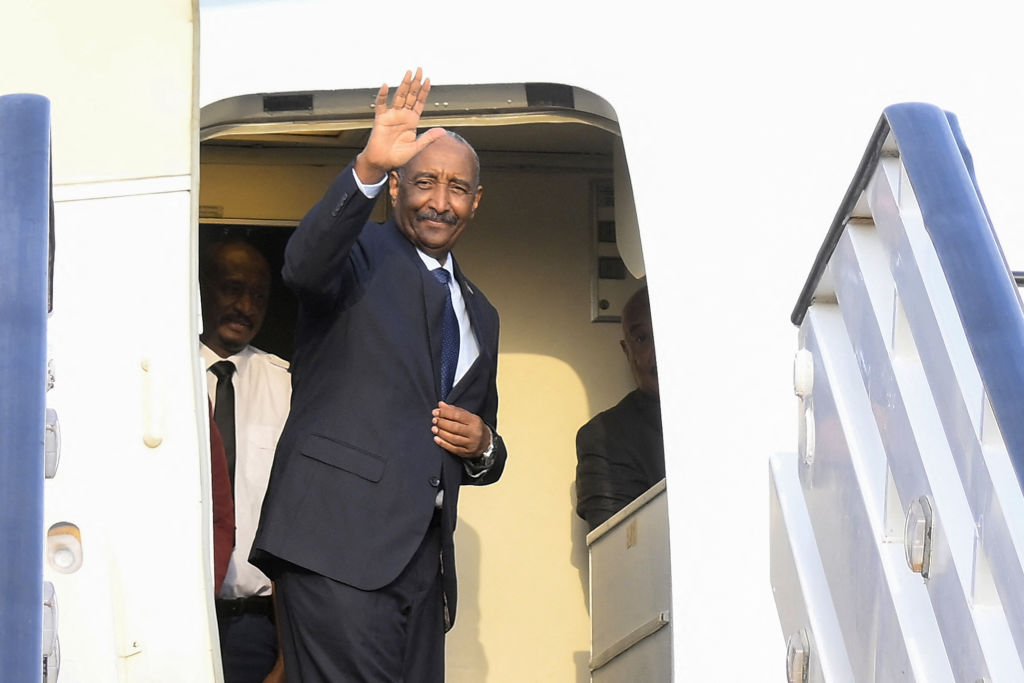Al-Burhan Tries Shuttle Diplomacy to Achieve What Has Failed Militarily
ADF STAFF
As the conflict between the Sudanese Armed Forces (SAF) and the Rapid Support Forces (RSF) grinds on, Sudan’s de facto leader, Gen. Abdel Fattah al-Burhan, spent several weeks in August and September traveling outside Sudan to buttress relations with neighboring countries and allies in the Persian Gulf.
Al-Burhan also visited the annual gathering of heads of state at the United Nations General Assembly, where he gave a speech. His rival Hemedti also released a video message. Each blamed the other for starting the conflict that has riven their country while pledging themselves to finding a peaceful resolution.
Al-Burhan’s shuttle diplomacy within eastern Africa and the Middle East is designed to reinforce his position as Sudan’s leader and an attempt to do politically what he was been unable to do militarily, according to Muhammad Khalifa al-Siddiq, professor of political science at the International University of Africa in Khartoum.
“By visiting Egypt and South Sudan, albeit briefly, Burhan is showing that he is willing to seek a rapid political solution at a time when several international initiatives are on the table,” al-Siddiq told France24. “If he thought he could resolve the conflict by military means alone, he would have stayed at home and used all available means to defeat the RSF.”
The countries al-Burhan visited — Egypt, Eritrea, Qatar, South Sudan, and Turkey — have either sided openly with him in the conflict, such as Egypt, or have played a role in mediating previous conflicts in Sudan, as is the case with South Sudan.
After the collapse of peace talks in Jeddah, Saudi Arabia, Egypt in July created a group of Sudan’s neighbors and six other countries to attempt to find a solution to the conflict.
Al-Burhan may be seeking financial support for rebuilding Sudan after the conflict ends or he may be seeking more weapons for his side, Waleed Madibo of the Sudan Policy Forum told Al Jazeera.
Soon after hostilities broke out in April, al-Burhan nullified the 2017 law that made the RSF an official wing of the military and declared the militia a rebel group. Al-Burhan’s declaration was intended to isolate the RSF, experts say, and he has warned the African Union and other countries to avoid contact with the RSF, which has its own allies in Libya and the United Arab Emirates as well as with Russia’s Wagner Group mercenaries.
“By dissolving the RSF, he has closed the door to any reconciliation,” Madibo said.
Analysts say that al-Burhan was able to travel only after he slipped out of his Khartoum headquarters, which have been under attack by RSF fighters since April, and established a new base 1,000 kilometers away in Port Sudan. With al-Burhan in Port Sudan, Hemedti has threatened to create a rival government in Khartoum, an act that would effectively divide the country in east and west.
Hemedti’s threat drives home the urgent need to replace the ruling Sovereignty Council to restore order to Sudan, according to retired army Maj. Gen. Amin Magzoub, director of the Center for Strategic and Security Studies in Khartoum.
“There is a need to create a genuine government to replace the existing administration, which is mandated to run the country’s day-to-day affairs,” Magzoub told The National. “The continuing absence of a genuine government will put Sudan on the road to being a failed state.”


Comments are closed.